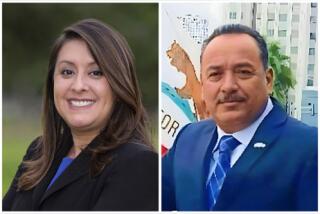They’re Still the Team to Beat
- Share via
I used to be friends with the Berman-Waxman Machine. Now, they don’t return my phone calls.
When we were friends, there were lunches with the organization’s political consultants, Michael Berman and Carl D’Agostino, and a warm welcome on election nights at their office, on the southern fringe of Beverly Hills, where political hot shots stop for something to eat and drink after the early evening parties.
Although the acronym for their firm is BAD Campaigns, in the pleasant glow produced by cold cuts, fruit, soft drinks and beer, BAD means good. Nowhere on the whole gossip-mad Westside are there better rumors or more cutting analyses of political personalities.
One afternoon at The Times, however, my editor handed me a copy of a memorandum someone had slipped to the newspaper. Written by Berman and D’Agostino, it contained tough-minded advice to Los Angeles City Councilman Zev Yaroslavsky on how to unseat Mayor Tom Bradley. It was “The BAD Memo,” and the story I later wrote about its contents ended phone conversations with Berman and D’Agostino.
This was definitely a loss. The Berman-Waxman Machine is a center of power. My mild dismay at being denied access reminded me of that.
The organization, named for Democratic Reps. Howard Berman of Sherman Oaks and Henry Waxman of Los Angeles, dominates politics on the Westside and in San Fernando Valley communities on the hillsides and the flatlands around Ventura Boulevard.
It’s a strange sort of political machine, without the usual trappings of patronage and big bosses. These people can’t even hand out a road-building contract. They don’t need to. Waxman is the most powerful of the machine leaders. He is a short, bald man who, although most amiable to friends and family, doesn’t smile much in public. A conversation with Waxman is no place for small talk. He can’t stand superficial people. Give him the weighty issues of air pollution, foul water, AIDS research, generic drugs and adolescent pregnancies. But be prepared: If you engage him on those topics without preparation, you will be treated with a brusqueness just short of rudeness.
Howard Berman and the other member of the leadership triumvirate, Rep. Mel Levine of Santa Monica, are more agreeable. Both are involved in issues as complex as Waxman’s. But their affinity for difficult national issues has not lessened their enjoyment of low-down local politics.
And therein lies the secret of their success.
When most local politicians escape to Washington, they leave City Hall behind. Not this bunch. Mindful of the adage that all politics are local, the congressmen never forgot their base.
They developed that base in the 1960s, when the WASP-dominated political life of Los Angeles was changing and the city was moving into an era of ethnic politics. The Waxman-Berman organization understood this change better than anyone else, and hit on what has become the singularly most effective way to exploit it.
Their discovery was deceptively simple: Use computers to aim mailed advertising at individual neighborhoods, with messages targeted to each area’s special problems. In predominantly Jewish areas, for example, the mailers often spoke of candidates’ support of Israel. Democratic Party ties were emphasized.
These expensive mailings were financed by campaign contributions raised with persistent requests from Waxman, who is one of the House’s most powerful Democrats, and others associated with the organization. They started on the Westside and expanded into the Valley.
Their mailings helped elect Westside state legislators loyal to the organization. They backed Bradley when he was elected in 1973, although splitting with him later. Their man Rick Tuttle was elected Los Angeles city controller, although their candidate for city attorney was beaten by James Hahn.
The organization will face one of its most challenging tests in 1993, when Los Angeles selects a mayor. With Bradley in decline, political leaders are already lining up for that faraway race. If the past is a guide, the Berman-Waxman group will be backing Yaroslavsky.
The political arena has changed. Ethnic politics are more important in Los Angeles than they were when the Berman-Waxman organization began. Two Latino council members, Richard Alatorre and Gloria Molina, may run, taking advantage of a growing Latino electoral base. Councilman Michael Woo is developing his Asian support.
But, with its command of money and modern political communications, Berman-Waxman is the team to beat.
More to Read
Sign up for Essential California
The most important California stories and recommendations in your inbox every morning.
You may occasionally receive promotional content from the Los Angeles Times.










